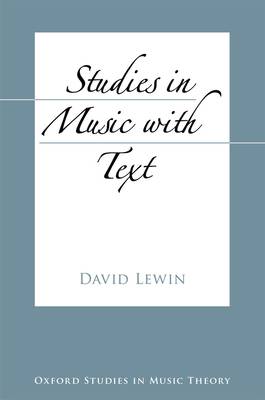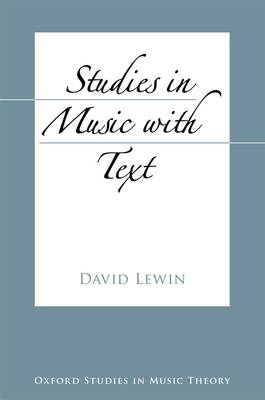
- Retrait gratuit dans votre magasin Club
- 7.000.000 titres dans notre catalogue
- Payer en toute sécurité
- Toujours un magasin près de chez vous
- Retrait gratuit dans votre magasin Club
- 7.000.000 titres dans notre catalogue
- Payer en toute sécurité
- Toujours un magasin près de chez vous
96,95 €
+ 96 points
Format
Description
Hailed by the New Grove Dictionary of Music (2nd edition) as "the most original and far-ranging theorist of his generation," David Lewin (1933-2003) explored for over four decades how composers in the German tradition set poetry and drama to music. He conceived Studies in Music with Text as a unified collection, reproducing papers on music by Mozart, Schubert, Wagner, Schoenberg, and Babbitt, many of which have become classics in the fields of music theory and historical musicology. He also included new analytical essays on Mozart, Wagner, and Schubert, and provided fresh readings of selected songs by Clara Schumann, Robert Schumann, and Johannes Brahms.
The analyses collected here focus on how the music, from its small details to its large formal schemes, engages the poetic and dramatic dynamics of the works at hand, and how music and text enact each other reciprocally. A recurrent topic is the theatricality of texted music for the concert as well as operatic stage, and Lewin's perspectives offer many interpretive insights and conceptual perspectives for the musical performer. A methodological eclectic, Lewin cultivated a magisterial command of historical theories and thought deeply about how those theories could inform contemporary understanding. Analytical models by Zarlino, Schenker, Riemann, Rameau, and Babbitt are brought into play, and the range of poetic and dramatic questions that emerge are explored, concerning inter alia psychological and social identity, the relation of psychological inner worlds to phenomenal reality, and the narrowly biographical and broadly historical conditions of artistic creation. As it illuminates the richness and profundity of the language/music partnership, Studies in Music with Text offers incisive thinking about the scope--and limitations--of descriptive and analytical discourse about music.
The analyses collected here focus on how the music, from its small details to its large formal schemes, engages the poetic and dramatic dynamics of the works at hand, and how music and text enact each other reciprocally. A recurrent topic is the theatricality of texted music for the concert as well as operatic stage, and Lewin's perspectives offer many interpretive insights and conceptual perspectives for the musical performer. A methodological eclectic, Lewin cultivated a magisterial command of historical theories and thought deeply about how those theories could inform contemporary understanding. Analytical models by Zarlino, Schenker, Riemann, Rameau, and Babbitt are brought into play, and the range of poetic and dramatic questions that emerge are explored, concerning inter alia psychological and social identity, the relation of psychological inner worlds to phenomenal reality, and the narrowly biographical and broadly historical conditions of artistic creation. As it illuminates the richness and profundity of the language/music partnership, Studies in Music with Text offers incisive thinking about the scope--and limitations--of descriptive and analytical discourse about music.
Spécifications
Parties prenantes
- Auteur(s) :
- Editeur:
Contenu
- Nombre de pages :
- 432
- Langue:
- Anglais
- Collection :
Caractéristiques
- EAN:
- 9780195397031
- Date de parution :
- 12-11-09
- Format:
- Livre broché
- Format numérique:
- Trade paperback (VS)
- Dimensions :
- 156 mm x 234 mm
- Poids :
- 589 g







